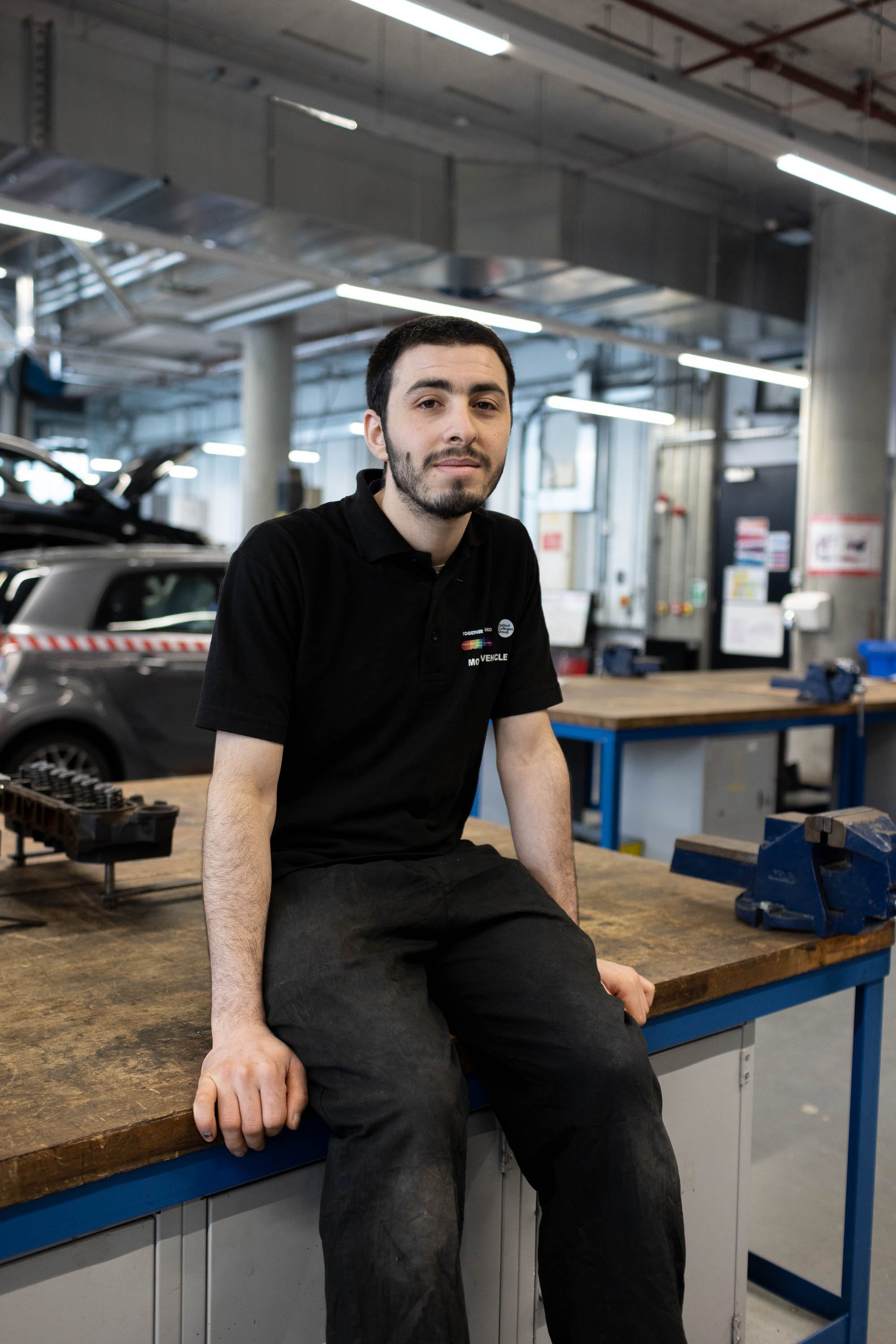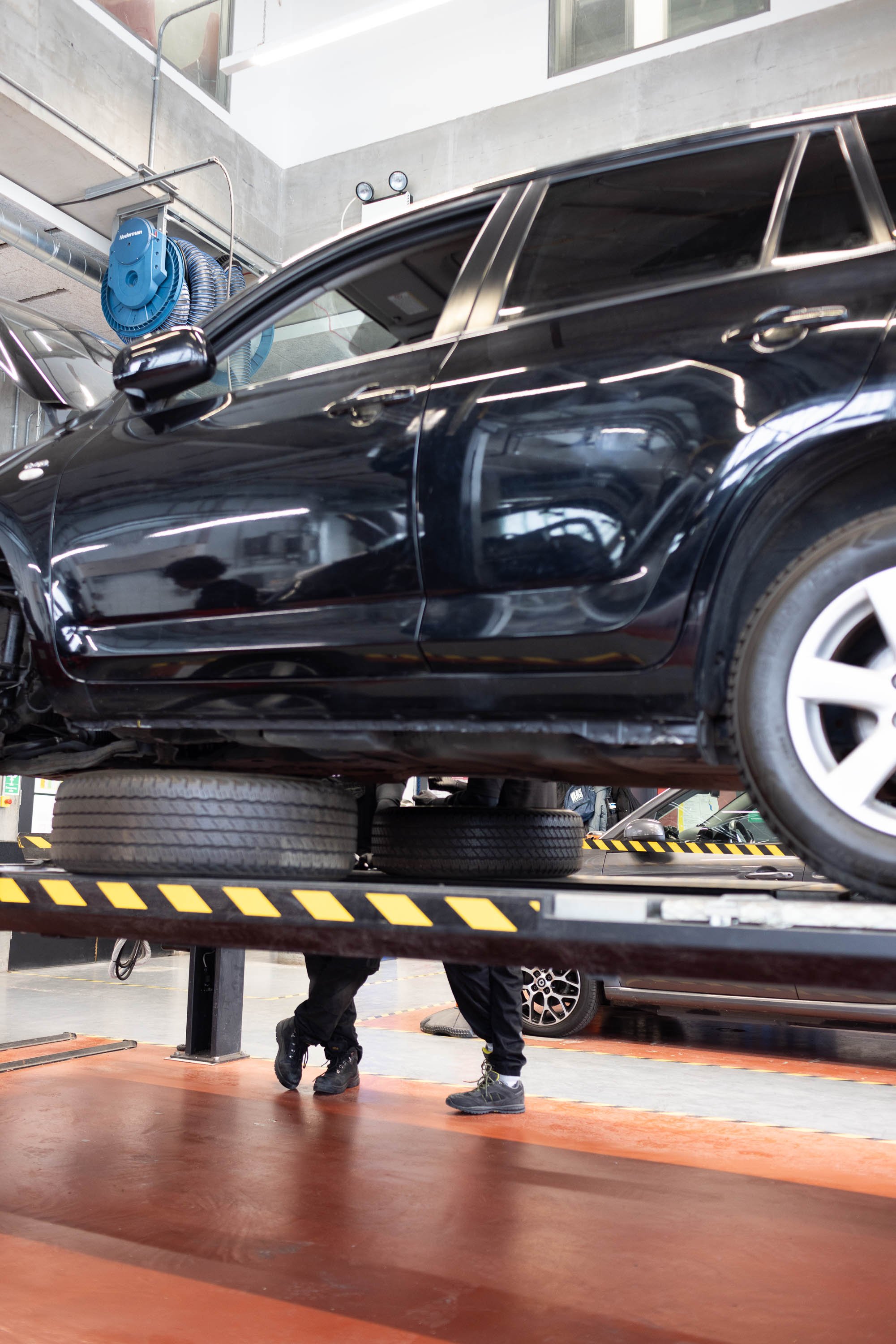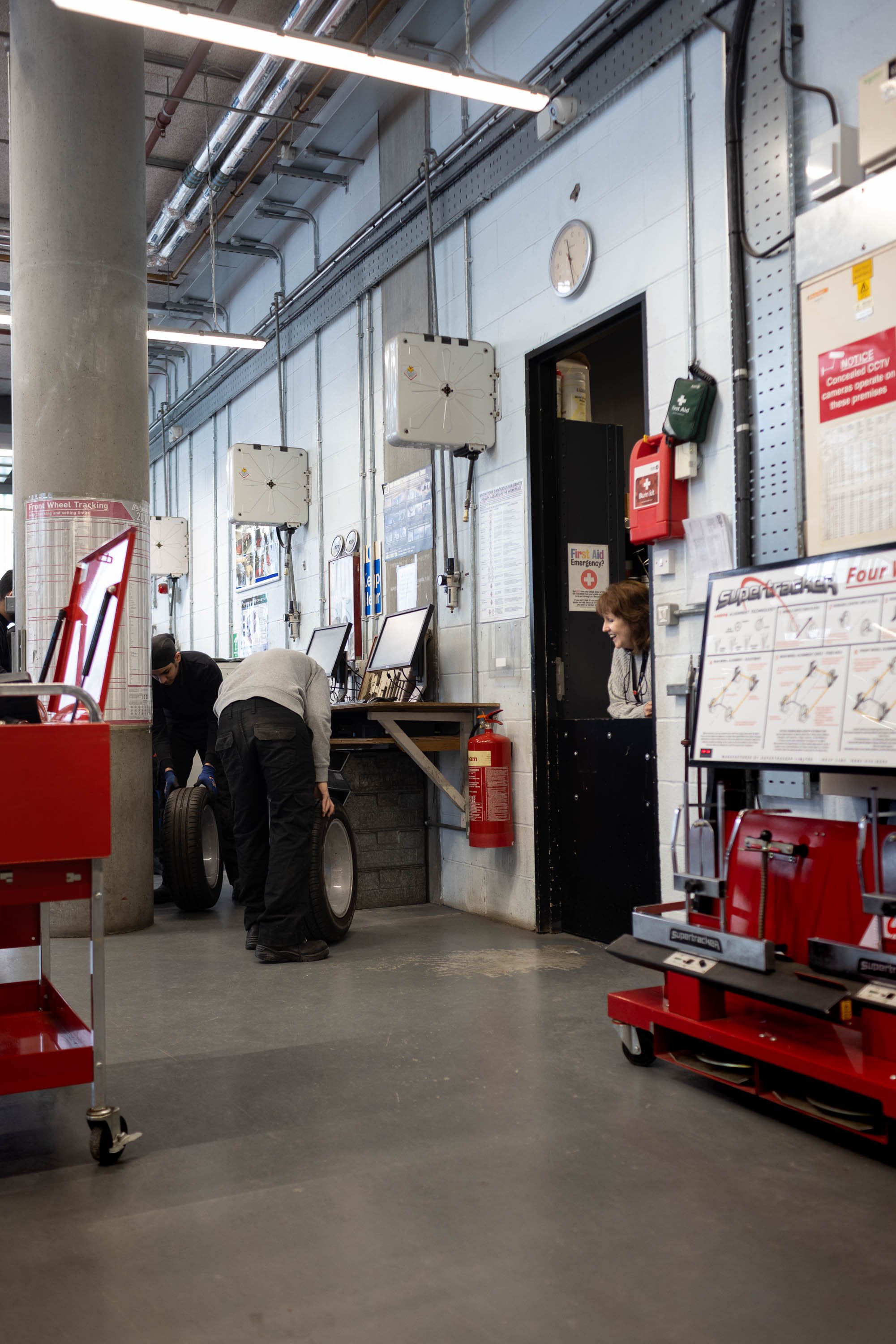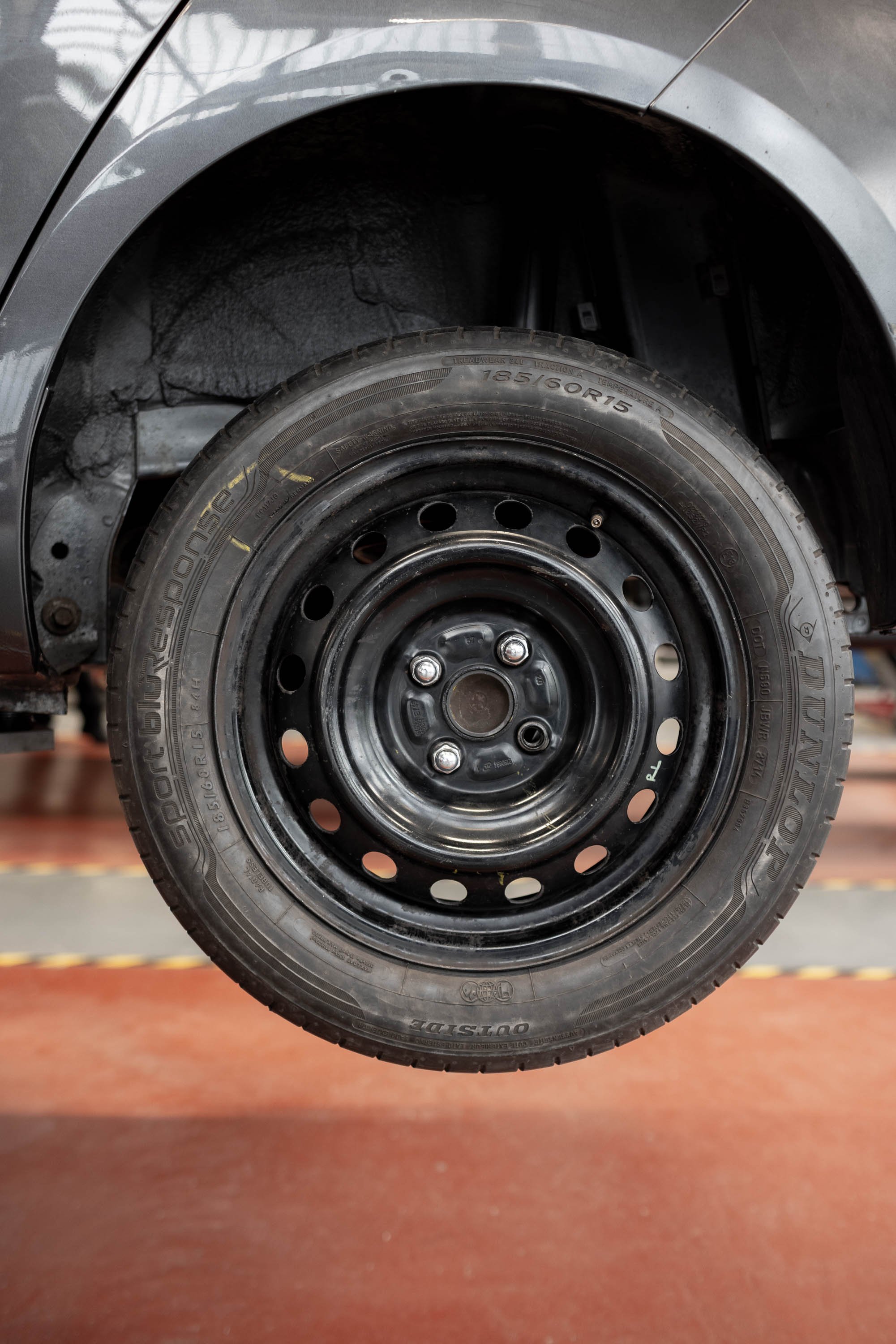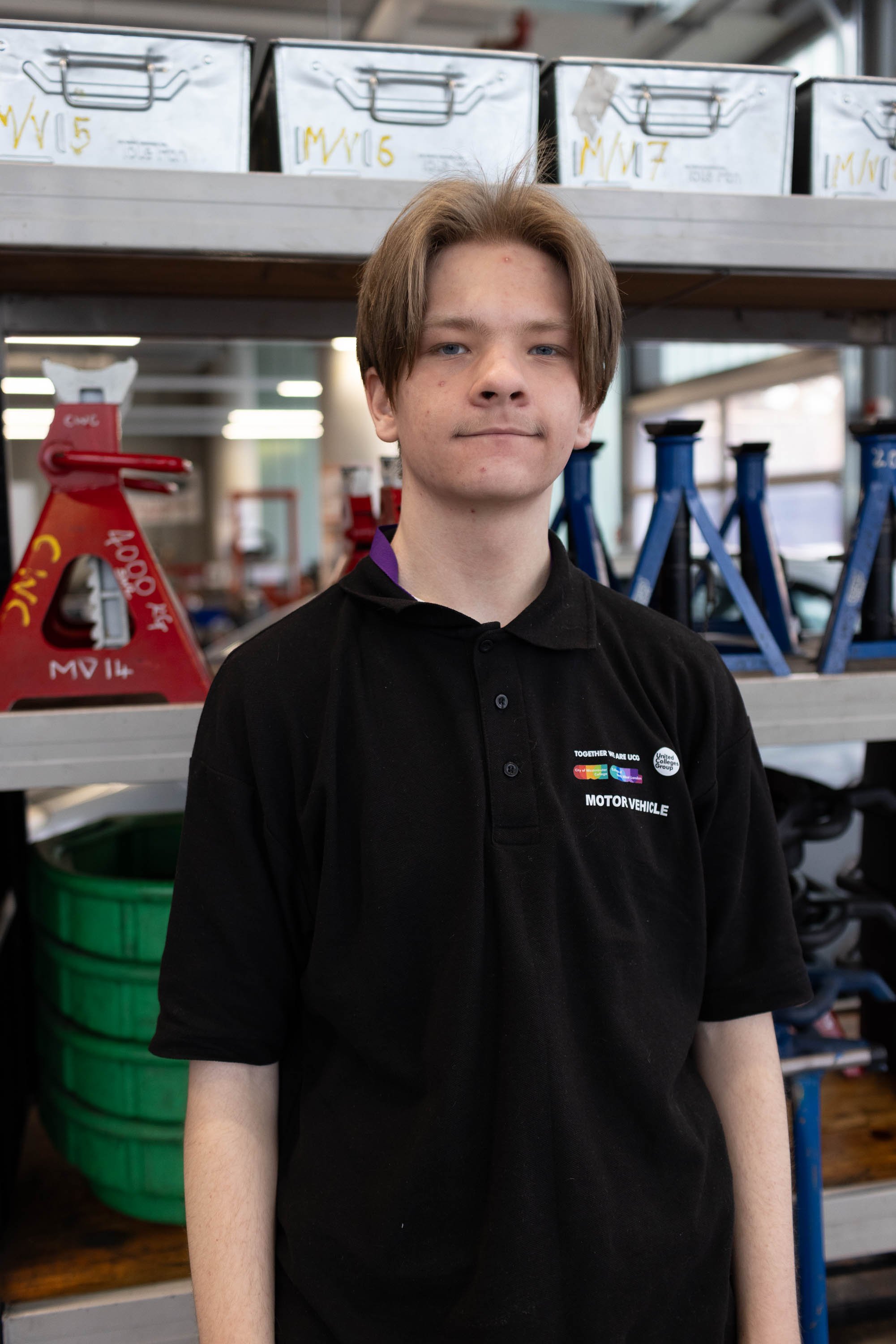Mechanics Stories: The mechanics of tomorrow

Focused on students developing their knowledge of Motor Repairs at London’s City of Westminster College, we follow their journey towards learning the craft of motor repairs within the evolving landscape of future mobility.
It takes us a while to locate the building, walking under a pedestrian tunnel through what feels like the middle of the motorway. But once Google Maps tells us we’ve reached our destination, there is no denying this is it. A large, colourful building - City of Westminster College.
On a wall in the hallway is a whiteboard with a rainbow typeface that reads ‘Technology and Construction Career Paths’. It lists out the potential career opportunities for students studying the different courses available. And there are a lot. City of Westminster offers over 200 courses to study and it's clear that fostering further aspirations is deeply ingrained in the school's ethos.
A quiet study area in the college. The whiteboard lists out careers, including Automotive Engine Tester, Electronics Technician, Motor Mechanic, and Technical Sales Engineer, to name a few
We’re in a Level 2 class of around ten students; they’re in their second year of the Motor Vehicle Repair and Maintenance course. The sheer size of the workshop facility is impressive. The high ceilings are even higher here and a range of cars, complex looking tools and walls of equipment gives a sense of commercial reality to the training space.
Dave, the course professor, talks students through how to operate a device to be used for vehicle testing
We begin by asking Muhamad and Igor, two students, what day one in the facility was like. Having met on that first day and being friends since, that new-student-feeling rang true. We learn that their routes into the motor space are through real life experience of the craft, driven by a strong personal passion for cars and mechanical engineering.
Working as a mechanic since just thirteen years old, Muhamad’s introduction to this course is one of deep-rooted familiarity: “I was working in Lebanon, because of the war in Syria. When I was thirteen years old, I started [working as a] mechanic. Then when I came to England, I was in school aiming to work as a mechanic… preparing. Only me [out of my family] has experience with [the mechanics field].”
With such extensive experience under his belt, he reveals he’s more than happy to help his classmates. He also recognises that being unsure is a key part of the learning process and that shying away from this is a hindrance: “If you don't know, ask questions. Don't be scared. If you don't know something, just try. It costs nothing. I'm ok to ask for help, but first I like to try. I like to solve problems.”
Having moved from Poland to the UK towards the end of secondary school, 18 year old Igor credits experiences in youth as fuel for his interest in the automotive space: “I played a lot of racing games in my childhood, so I kind of grew up with that passion for cars - different parts of the car as well. As I got older my passion grew to hopefully make a living.”
He mentions his father’s diploma in mechanics and the guidance he sometimes receives about technical skills, like understanding the four-stroke cycle of four-stroke engines: “It’s mostly my passion and love for the automotive industry [that made me study this course]. I thought it would be a great idea if I chose any college that would have a course that relates to the industry, and luckily this college had the course.”
The Motor Vehicle Repair & Maintenance course is one of many offered in London at a range of levels, training students on servicing, diagnostics and repairs through both practical and theory work. Part of today’s workshop session includes carrying out an MOT inspection - checking brakes suspension, wheels, tyre pressure, to name a few aspects. The students are all hands on deck in the background, and the clanging of tools and hum of machinery reverberates across the facility and into the walls, quietening only when they stop to jot observations onto clipboards.
“I like the hands-on experience, like you’re pretty much actually working on a car. [Looking at] the rigs, engineer rigs, brake rigs... it’s a bit of an easier way to know how to remove and replace parts. There’s also machines like the tyre machines, wheel balancing machines, learning about the tyre-wheel aspects… the hands-on stuff is the best part.”
Having team camaraderie during these tasks is a trait Muhamad values, especially considering how much of the work can happen successfully only through collaboration: “I like working as a team. If there's something you don't know, you can ask your colleague and they'll give you the best ideas. If there are new tools [to use], or a new job to do, that you don't know, you can work on it and you can learn.”
And Igor echoes this sentiment, emphasising that a big part of succeeding in this course boils down to your ability to collaborate effectively with others: “Working with somebody else [is important]. I can work well with other people, problem solving… If we have a car part that breaks, or a very difficult part to remove, you have your partner you can ask help with to solve the problem.”
Focusing on the future of mobility, Igor highlights the popularity of Musk’s Tesla, not only a viral sensation for its aesthetics but a vanguard for environmental good. The openness of where the technology could take us excites Muhamad.
However, he also reminisces on nostalgic YouTube videos of Schumacher’s F1 races, noting the V10 power engine’s replacement with a hybrid V6 creates an odd quietness: “Some people have a negative perception [of electric vehicles] because the engines are really quiet. They’re so used to the loudness and the unique sounds of intricate features of the engine from petrol.”
As electric and hybrid vehicle production and ownership become more common, many traditional mechanics are apprehensive about adjusting to these changes, one particular aspect being the skills gap. From a student POV, these challenges are maybe just as anticipated, especially for those who don’t have as much specialised training.
“Of course we have to learn new skills. With electric cars, they don’t have [the same] engines. So we have to learn more about electric cars… It’s quite challenging, everything becoming new now. They don’t use engineers with electric cars [as much]… I think it’s a big challenge for us, even the people who have 30 years experience.”
Muhamad looks around at the facility, pondering what the future pipeline will look like for students in this profession. It may just be those with access to a specialised program of study who can enter work with these new vehicle models. What will happen to the profession if they can’t keep up?
If petrol-powered engines are to become the cars of yesterday, assuming the position of vintage and classic cars, then there may be a space for this professional practice to remain. As for the darker threat of technology (robots taking over!), it doesn't seem immediate or entirely likely in the realm of mechanics and technicians. Maybe in manufacturing, where in-house materials are produced, it's more plausible.
“I think electric powered vehicles are going to become an abundant thing. I think there would have to be a big change to the course to be more centred into electric-powered vehicles. There will definitely be more jobs in between - half [will be] people doing the manufacturer’s job, anything that we work on today. And there will probably be more popular choices for people our age, to develop cars from yesterday.”
We also met Dave, the course professor. He has taught in this field for over 55 years across different levels of pre and post higher education. He’s seen things evolve over many years and offers an insightful perspective into the acceleration of change currently facing us. The career options are abundant for students in this institution and it’s clear that studying this course is setting them up for success.
We know that change is coming. And we don’t yet know how extensive that will be as new forms of mobility are designed and built. Much like any industry though, being flexible and agile is key. Skills are not static and any career is a journey, where one of the most important goals is having options and choices.
Muhamad echoes this when he says: “My director always says, keep studying until you finish Level 3. Then decide if you want to go to university, or if you want to work in a company. Of course, I have to finish my level 3 first, look at what I can do next. I can go to uni, or I can choose one of the big companies in London.” What he really wants though, is to follow his passion and work at BMW; his favourite manufacturer.
Igor agrees: “My biggest dream would probably be [working] for a manufacturer, to be a technician in a brand.” In a path driven so much by passion, it’s plain to see that whatever changes may come to the automotive industry - the people who are driven by their love of cars will adapt and grow. And with any luck, they’ll get to work for their favourite brands too.
Through getting to know Muhamad and Igor, we can clearly envision them in these spaces, their intelligence paired with curiosity a powerful combination. The need to nurture such dreams is important, including the quality of education and training; foundational in instilling self-belief as much as providing the appropriate tools to succeed long after completion of studies. We still have ground to cover to keep up with the fast pace of the automotive industry. The big question is - will education ever be able to match the speed?
Words by Tahanni Yehya Hussein
Photography by Hélène Jeunet



